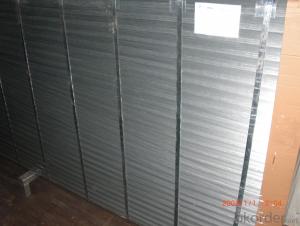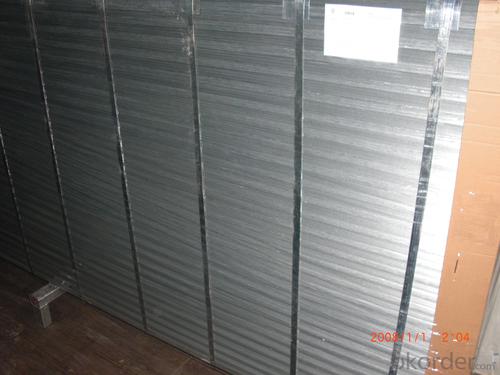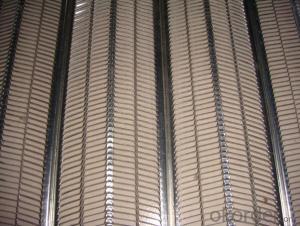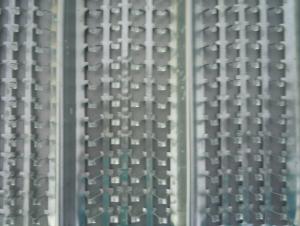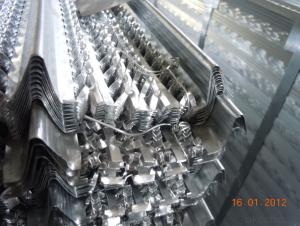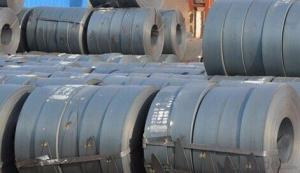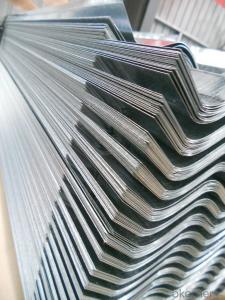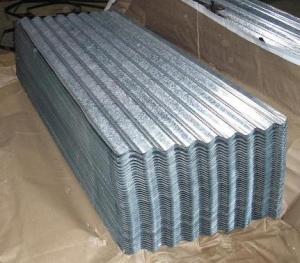GAVANIZED STEEL Rib Lath
- Loading Port:
- China Main Port
- Payment Terms:
- TT OR LC
- Min Order Qty:
- -
- Supply Capability:
- -
OKorder Service Pledge
OKorder Financial Service
You Might Also Like
GAVANIZED STEEL rib mesh is made of hot-dip zinc coated steel sheet,
It is used to be the material of untake out formwork for concret, widely used as plaster backing on ceilings, walls and stud partitions. Rib Lath is also ideal for refurbishing damaged or aged masonry walls when a key for rendering is not certain due to disintegration or softening of the wall face.
Application:
Construction formwork mesh has very good engineering quality and construction security;
Construction formwork mesh as the concrete permanent assembly
free sheet is much convenient for engineering design and processing;
Construction formwork mesh is widely used in tunnels,bridges and valve system and so on to make the process of construction much more fast and stable.
ZINC COATING: G40 WEIGHT: 4.2KG/SHEET
- Q: What is the process of polishing steel sheets?
- The process of polishing steel sheets typically involves several stages such as grinding, sanding, buffing, and finishing. Initially, the steel sheets are carefully ground to remove any imperfections or surface irregularities. Subsequently, sanding is conducted using different grits of sandpaper to refine the surface further and achieve a smoother texture. Following sanding, buffing is performed using various polishing compounds and a rotating wheel or pad to bring out a shiny, reflective finish. Finally, the steel sheets are thoroughly cleaned and inspected before being considered polished and ready for use in various applications.
- Q: What are the different surface textures for pre-painted steel sheets?
- The different surface textures for pre-painted steel sheets can include smooth, embossed, textured, and patterned finishes.
- Q: Can steel sheets be formed into complex shapes?
- Yes, steel sheets can be formed into complex shapes through various metalworking processes such as bending, rolling, stamping, and laser cutting. These processes allow the steel sheets to be manipulated and transformed into intricate and custom shapes, meeting the specific design requirements. The malleability and strength of steel make it possible to form it into complex shapes without compromising its structural integrity. These capabilities are widely utilized in industries such as automotive, aerospace, construction, and manufacturing, where complex and precise components are required.
- Q: How are steel sheets protected against corrosion?
- Steel sheets are protected against corrosion through various methods such as galvanization, which involves coating the steel with a layer of zinc; applying protective coatings like paint or epoxy; using corrosion inhibitors or rust-preventive oils; or implementing cathodic protection techniques. These measures create a barrier between the steel and the corrosive elements, preventing or slowing down the process of corrosion.
- Q: How do steel sheets perform in terms of thermal conductivity?
- Steel sheets have high thermal conductivity, meaning they are capable of conducting heat efficiently.
- Q: What is the maximum size available for steel sheets?
- The maximum size available for steel sheets can vary depending on the manufacturer and specific requirements, but commonly available sizes range from 4 feet by 8 feet (1.2 meters by 2.4 meters) to 6 feet by 20 feet (1.8 meters by 6.1 meters).
- Q: What are the different thickness options for steel sheets?
- The thickness options for steel sheets can vary depending on the specific type and application, but common options range from very thin sheets around 0.4 mm (0.0157 inches) to thick sheets up to 25 mm (0.9843 inches) or even thicker for certain industrial uses.
- Q: Can the steel sheets be used for automotive body panels?
- Yes, steel sheets can be used for automotive body panels due to their strength, durability, and ability to withstand impact and corrosion.
- Q: What are the different types of steel sheet finishes?
- Various purposes are served by several different types of steel sheet finishes, each providing unique aesthetics. Some common types include: 1. Hot Rolled: Achieved by heating the steel sheet above its recrystallization temperature and rolling it to the desired thickness. It has a rough and textured surface, suitable for applications where appearance is not a priority. 2. Cold Rolled: After hot rolling, the steel sheet is passed through rollers at room temperature to achieve a smooth and polished finish. Cold rolled finishes are often used in applications that require a superior surface finish, such as automotive panels or appliances. 3. Galvanized: In this process, the steel sheet is coated with a layer of zinc to provide corrosion resistance. The zinc coating also gives the sheet a shiny and reflective appearance. Galvanized finishes are commonly used in outdoor applications to protect against rust and harsh weather conditions. 4. Stainless Steel: Achieved by adding chromium to the steel sheet, providing excellent corrosion resistance and a sleek, reflective surface. Stainless steel finishes are widely used in kitchen appliances, architectural applications, and medical equipment, where hygiene and durability are essential. 5. Coated Finishes: Steel sheets can be coated with various materials, like paint, epoxy, or polymer, to enhance appearance or provide additional protection. Coated finishes can be customized to meet specific requirements, such as color or texture, and are often used in architectural and decorative applications. 6. Brushed: Obtained by brushing the steel sheet with abrasive material, creating a textured and matte surface. Brushed finishes are commonly used in interior design and furniture manufacturing, where a contemporary and stylish appearance is desired. These examples represent just a few of the available steel sheet finishes. The choice of finish depends on the specific requirements of the application, such as corrosion resistance, aesthetic appeal, or surface texture.
- Q: What is the price range for steel sheets?
- The price range for steel sheets can vary depending on factors such as size, thickness, quality, and market conditions. However, generally, steel sheets can range in price from $20 to $200 per sheet.
Send your message to us
GAVANIZED STEEL Rib Lath
- Loading Port:
- China Main Port
- Payment Terms:
- TT OR LC
- Min Order Qty:
- -
- Supply Capability:
- -
OKorder Service Pledge
OKorder Financial Service
Similar products
Hot products
Hot Searches
Related keywords
